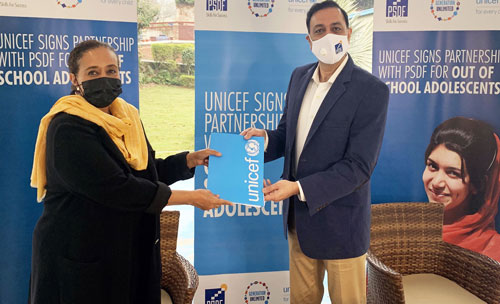Staff Reporter
Islamabad
The United Nations Children’s Fund (UNICEF) and the Punjab Skills Development Fund (PSDF) signed a partnership agreement yesterday, to implement a research and development project in support of adolescent and youth education, skills development and job placement as part of the ‘Generation Unlimited’ partnership in Pakistan.
The agreement will help research, design and pre-test an accelerated and cost-effective ‘Non-Formal Education to Job Placement’ model to help improve the skills and employability of the most vulnerable and economically, socially disadvantaged adolescents and youth. It targets adolescents and young people who have never attended formal education or who dropped out of the formal education system without achieving primary school competencies, and who do not have access to education and economic opportunities. PSDF will work with UNICEF, federal and provincial governments, and partners from civil society organizations and the private sector to design and pre-test the ‘Non-Formal Education to Job Placement’ model in Punjab. It aims at offering a unique, integrated solution by simultaneously (1) providing adolescents and young people age 10-19 who are outside the formal education system with the opportunity to enroll in an Accelerated Learning Program so they can achieve foundational skills in literacy and numeracy at primary school; (2) equipping those who have achieved grade 5 competency level with job and entrepreneurial skills through training to enhance their capacities to access non-hazardous income generational opportunities; and (3) linking young people who have successfully graduated from the program to the labour market.










